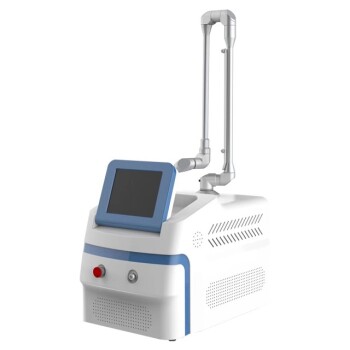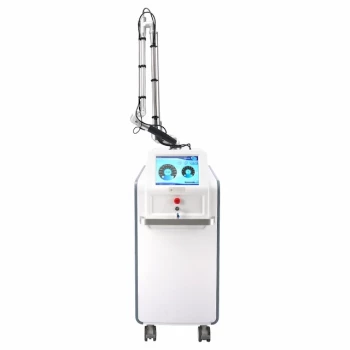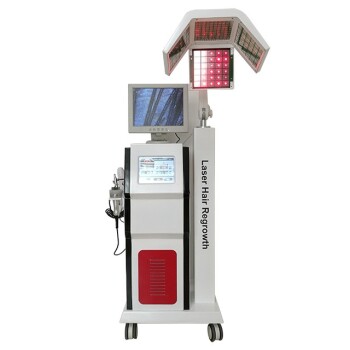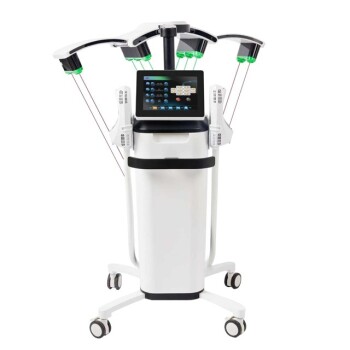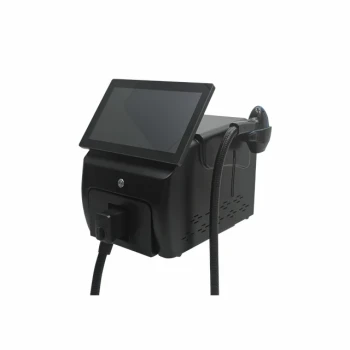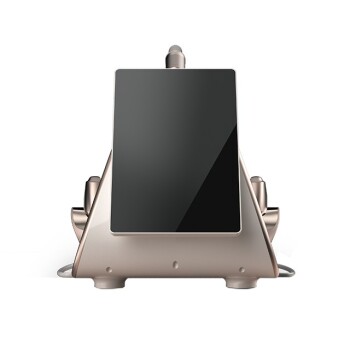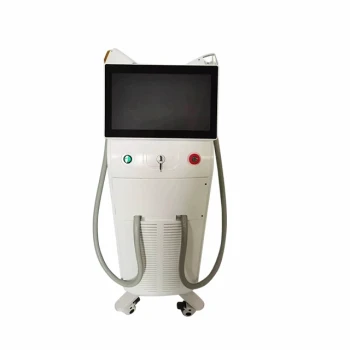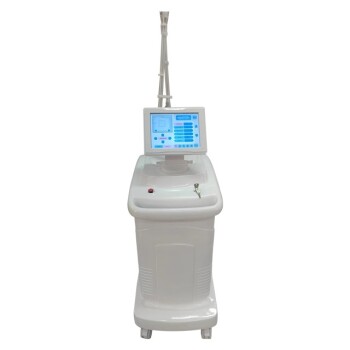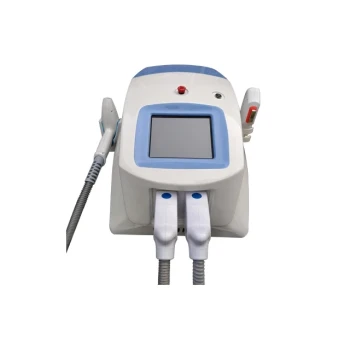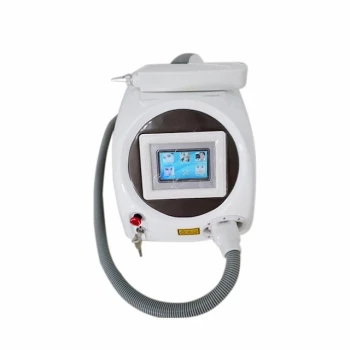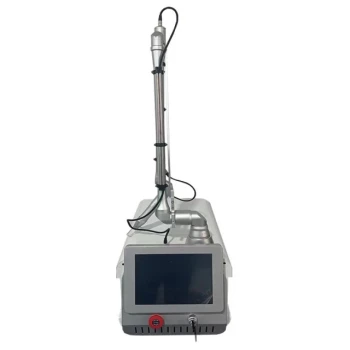In short, individuals with active skin infections, certain severe skin conditions, or compromised immune systems should not undergo Pico laser treatment. It is also contraindicated for those who are pregnant or breastfeeding and for patients taking specific photosensitizing medications.
The core principle is that Pico laser is a controlled-injury and healing process. Anyone with a condition that could impair this healing process, or make the skin react unpredictably to intense light energy, is not a suitable candidate for the procedure.
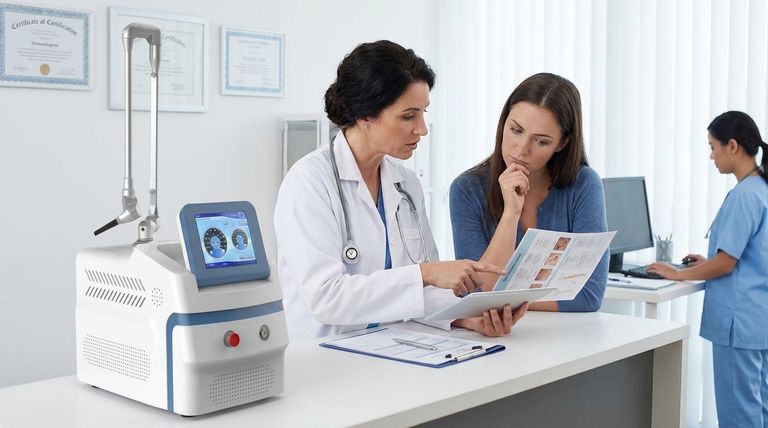
Understanding the Absolute Contraindications
Certain conditions present a clear and significant risk, making Pico laser treatment unsafe. These are generally considered absolute contraindications, where the potential for adverse effects outweighs any potential benefit.
Active Skin Infections or Conditions
Treating skin that is already compromised by an active infection (bacterial, viral, or fungal) can worsen the condition or cause it to spread.
Similarly, applying the intense energy of a Pico laser to inflamed skin from conditions like cystic acne, severe eczema, or psoriasis can trigger a flare-up and impede proper healing.
Pregnancy and Breastfeeding
There is a lack of clinical data on the effects of Pico laser energy on a developing fetus or a nursing infant.
Therefore, as a strict precaution, the procedure is not recommended for women who are pregnant or breastfeeding to avoid any potential, unknown risks.
Compromised Immune Systems
The body's immune response is critical for healing the micro-injuries created by the laser.
Individuals with compromised immune systems due to medical conditions (like autoimmune diseases) or immunosuppressive medications may experience poor healing, prolonged recovery, or an increased risk of infection.
Conditions Requiring Caution and Consultation
Beyond absolute contraindications, several factors require a careful evaluation by a qualified medical professional. These situations don't automatically disqualify you but necessitate a thorough risk assessment.
Use of Certain Medications
Photosensitizing medications—drugs that make your skin more sensitive to light—can cause severe adverse reactions when combined with laser treatments.
This category includes some antibiotics, retinoids (like isotretinoin), and certain herbal supplements. Full disclosure of all medications to your practitioner is essential.
Hypersensitive or Reactive Skin
While Pico laser is suitable for many sensitive skin types, individuals with extremely reactive skin or a history of poor healing (such as keloid scarring) require a cautious approach.
A test patch in an inconspicuous area is often necessary to gauge the skin's response before proceeding with a full treatment.
The Critical Role of Professional Consultation
The most significant pitfall is failing to get a proper assessment from a qualified and experienced practitioner, such as a board-certified dermatologist. Self-assessment is never a substitute for professional medical advice.
Why a Consultation is Non-Negotiable
A professional can accurately diagnose underlying skin conditions you may not be aware of. They will evaluate your skin type, medical history, and treatment goals to determine if Pico laser is not only safe but also appropriate for you.
Disclosing Your Full Medical History
Your safety depends entirely on your transparency. Be prepared to discuss all medical conditions, allergies, medications, and previous cosmetic procedures. Withholding information can lead to serious complications.
Making the Right Choice for Your Safety
Your decision to proceed should be guided by a clear understanding of your personal health profile and a professional medical opinion.
- If your primary focus is treating a skin concern while you have an active infection or flare-up: Prioritize resolving the acute condition with your dermatologist before considering any laser treatment.
- If you are pregnant, breastfeeding, or have a compromised immune system: Avoid the procedure entirely, as safety and predictable healing cannot be guaranteed.
- If you are taking medications or have a history of sensitive skin: A mandatory, in-depth consultation with a qualified practitioner is the only way to safely determine your candidacy.
Ultimately, an informed decision made in partnership with a medical expert is the best way to ensure a safe and effective outcome.
Summary Table:
| Contraindication Category | Key Reasons to Avoid |
|---|---|
| Absolute Contraindications | High risk of complications; treatment is unsafe. |
| Active Skin Infections | Can worsen infection or cause spreading. |
| Pregnancy & Breastfeeding | Lack of safety data for fetus/infant. |
| Compromised Immune System | Impairs healing, increases infection risk. |
| Conditions Requiring Caution | Requires professional evaluation before treatment. |
| Photosensitizing Medications | Can cause severe adverse skin reactions. |
| Hypersensitive/Keloid-Prone Skin | Risk of poor healing or scarring; test patch needed. |
Ensure the safety and efficacy of your Pico laser treatments with professional-grade equipment from BELIS.
As a specialist in professional medical aesthetic equipment, BELIS provides clinics and premium beauty salons with reliable, advanced Pico laser systems designed for optimal patient outcomes and practitioner confidence. Proper equipment is the foundation of safe practice.
Contact BELIS today to explore our range of medical aesthetic solutions and enhance your service offerings.
Visual Guide
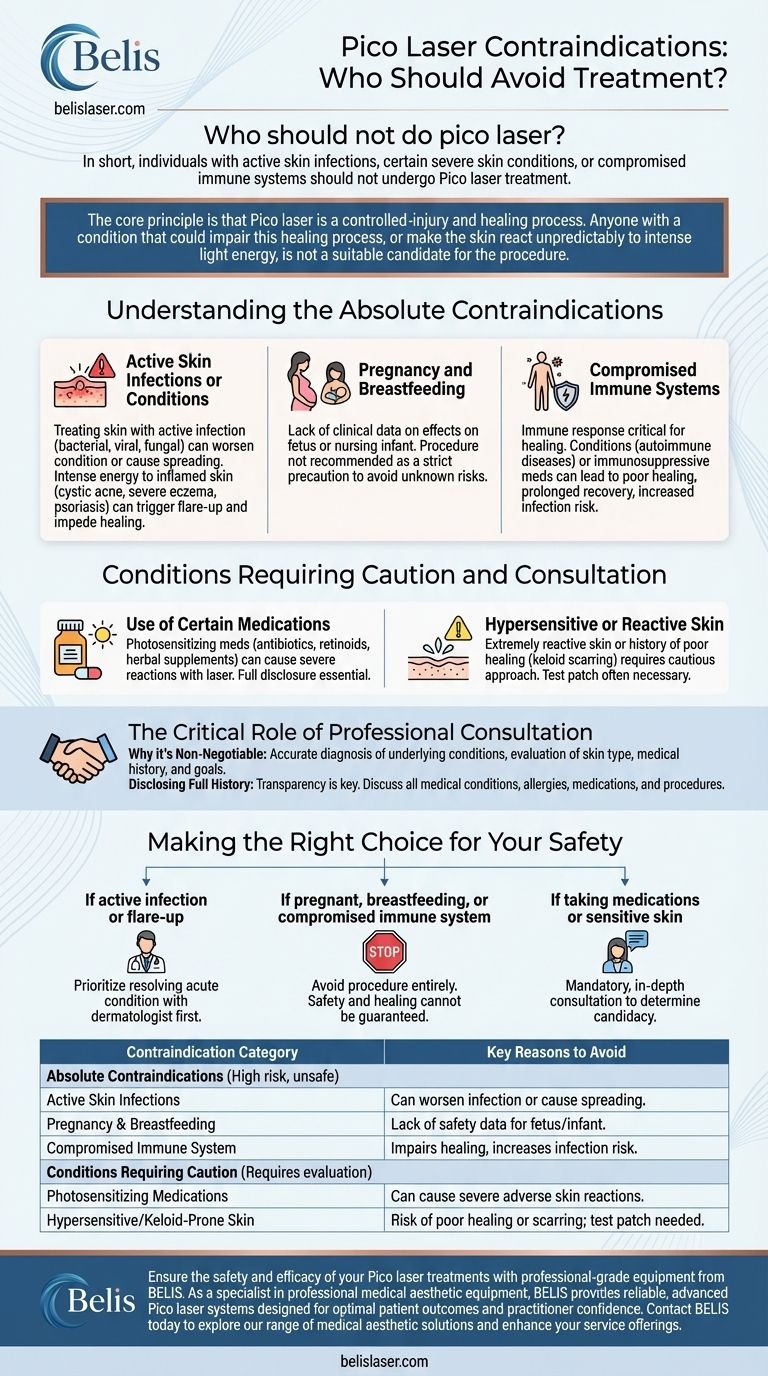
Related Products
- Pico Picosecond Laser Machine for Tattoo Removal Picosure Pico Laser
- Pico Laser Tattoo Removal Machine Picosure Picosecond Laser Machine
- Multifunctional Laser Hair Growth Machine Device for Hair Growth
- EMSlim RG Laser Body Sculpting and Slimming Machine
- Diode Laser SHR Trilaser Hair Removal Machine for Clinic Use
People Also Ask
- For which applications are Pico lasers considered versatile? A Guide to Elite Skin Restoration
- Why are high-precision laser parameters used in LADD? Optimize Drug Delivery and Safety with Precision Control
- What are the practical applications of the new Pico lasers? Advanced Solutions for Tattoos & Skin Rejuvenation
- What is the longevity of Pico laser treatment results? Maximize Your Skin Transformation and Durability
- What technical advantages do Picosecond Lasers offer? Shatter Melasma with Advanced Photoacoustic Precision
